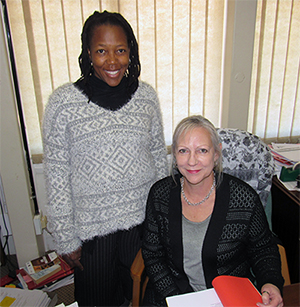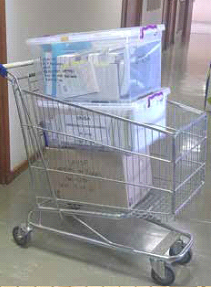

Dorcas Ndou and Adri Humphreys
Imagine two trolleys piled high, not with groceries, but with books and conference papers. This is how the hard work of academics is delivered to the Department of Higher Education and Training (DHET) to calculate Unisa’s subsidy-earning research output.
Packing these two trolleys is just the tip of the iceberg. The real work takes months of meticulous sifting, recording and checking to ensure that you and Unisa receive your due for accredited research outputs.
Each year, Adri Humphreys and Dorcas Ndou of the Department of Research Administration go to great lengths to prepare Unisa’s annual Research Output Submission by the 15 May deadline. The load delivered to the DHET consisted of 1 750 items for the 2016 research year:
Humphreys and Ndou precisely record and double-check each item in a rigorous verification process.

Trolley loads of research material ready for dispatching to DHET
Preparations for the annual Research Output Submission start in December of each academic year, when the colleges submit all the books, chapters, conference papers and articles their researchers have produced for the year.
The first round of checking takes place in the colleges through the research coordinators. From there the research output submissions move on to the Research Support Directorate, where Humphreys and Ndou then check each item individually. In the case of journal articles, for instance, they check the article title, author, affiliation, order of authors and the journal title and ISSN, and then verify that the journal is indeed on the DHET’s list of accredited journals. After auditing, all these articles go to a storeroom for safekeeping.
The process for checking books and conference proceedings is slightly different. These publications are vetted at college level and then verified and checked at Research Administration. The final verification is done by the Institutional Vetting Committee, which vets the scholarliness and supporting documentation of each individual publication. Hard copies of these publications are then packed according to DHET stipulations and loaded onto trolleys for delivery to the DHET.
So, the next time you receive your share of the DHET subsidy, spare a thought for support staff behind the scenes who handle the load.
*By Clairwyn van der Merwe
Publish date: 2017-11-07 00:00:00.0